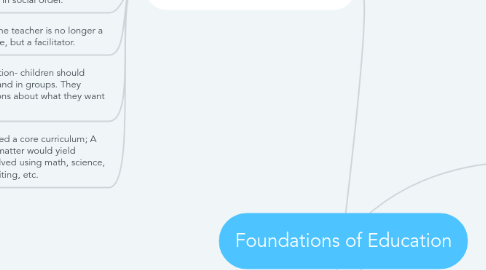Foundations of Education
by Bailey Sandlin

1. The Sociology of Education
1.1. Functionalism-focuses on the social aspect of school
1.2. Conflict Theory- believe social order is based on the ability of dominant groups to impose their will on subordinate groups through force and manipulation
1.3. Interactionalism- relation of school and society are primarily critiques and extensions of the functional and conflict perspectives
1.4. Five Effects of Schooling on Individuals:
1.5. 1. Employment- students believe graduating from college will lead to greater employment opportunities
1.6. 2. Knowledge and Attitudes- the effects school has on students' behaviors and knowledge
1.7. 3. Inadequate Schools- urban schools fail to educate minorities and poor children; crisis in U.S. education with not having the ability to educate children to prepare them for real life.
1.8. 4. Gender- Girls may have higher cognitive ability then men, but by the time they're in high school, their self esteem and drive to continue school decreases. Men are also paid higher than women in the work force.
1.9. 5. Tracking- in school tracking has a critical impact on student's mobility. Tracking is placing students in specific academic programs.
2. The Philosophy of Education
2.1. Pragmatism: Greek word "pragma" meaning "work". It is a philosophy that encourages people to find processes that work in order to achieve their desired ends.
2.2. Generic Notions- School becomes an "embryonic community" where students learn skills experentially and from books.
2.3. Key Researchers- George Sanders Pierce, John Dewey, and William James
2.4. Goal of Education- the goal of education was based on society. John Dewey vision of schools was rooted in social order.
2.5. Role of Teacher- the teacher is no longer a authoritarian figure, but a facilitator.
2.6. Method of Instruction- children should learn individually and in groups. They should ask questions about what they want to know.
2.7. Curriculum- followed a core curriculum; A particular subject matter would yield problems to be solved using math, science, history, reading writing, etc.
3. Politics of Education
3.1. Four Purposes of Education
3.2. 1. Intellectual- teach basic cognitive skills like reading and writing
3.3. 2. Political- inculcate allegiance to the existing political order
3.4. 3. Social-help solve social problems
3.5. 4. Economic- prepare students for their later occupational roles and to select, allocate, and train individual into the division of labor
3.6. The Role of the School: the role of the school is concerned with aims and purposes of education in a society.
4. The History of U.S. Education
4.1. The Reform of Education for Women and African Americans: Women were usually only housewives and never really had a place in education. By mid 19th century, girls were starting to attend elementary schools and private academies. African Americans were struggling with education concerning segregated schools for whites and blacks. In 1868, historically Black Colleges were established by the Freedman's Bureau, but segregation and inequality was still an issue years afterwards.
4.2. The Democratic- Liberal School: Democratic-Liberals believed in the evolution of a school system committed to providing equality and opportunity for all students. They believe the history of education involved reformers attempting to expand educational opportunities to larger segments of the population.


